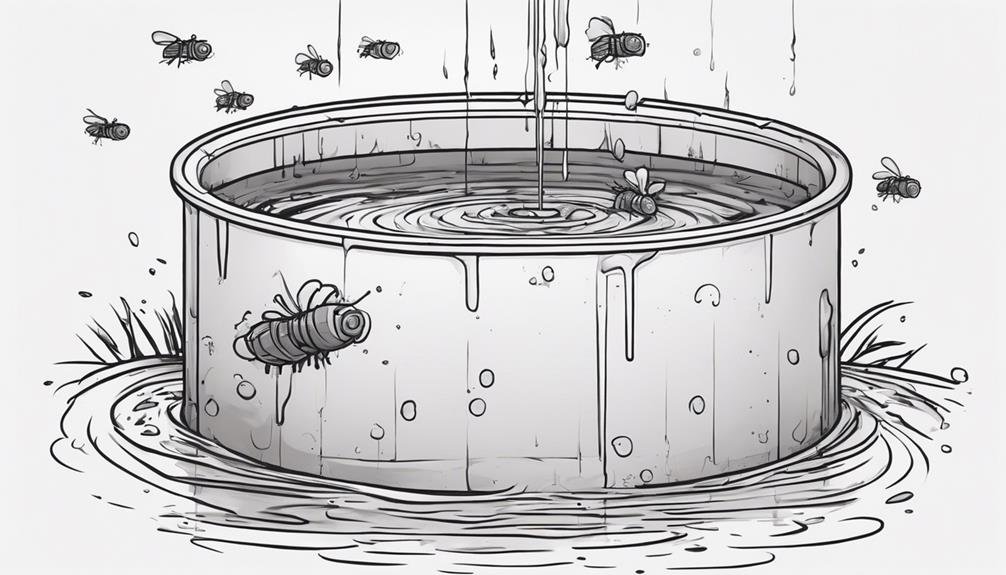When it comes to your septic system, think of it as a silent houseguest – efficient when well-maintained, but when overloaded, it can start whispering signs of distress. From gurgling drains to soggy patches in your yard, these clues might be your system's way of saying something's amiss.
Understanding these hints could save you from a messy situation. Let's explore the subtle indicators that could help you prevent a septic catastrophe.
Key Takeaways
- Foul odors and soggy areas indicate overload and necessitate tank cleaning.
- Regular maintenance prevents drain field clogs and system overload.
- Visual signs like lush grass and water pooling highlight septic tank issues.
- Water conservation is vital to prevent system overload and costly repairs.
Common Signs of Septic Tank Overload

If you notice foul odors emanating from your drains or soggy areas in your yard above the septic tank, these are common signs indicating septic tank overload. When a septic tank reaches its capacity due to lack of maintenance, it can lead to an overload, causing unpleasant odors and wet spots above the tank.
To address this issue, proper maintenance such as regular septic tank pumping is essential. Septic tank pumping involves removing the accumulated solids and sludge from the tank, preventing it from overflowing and causing further damage to the drain field.
In addition to septic tank pumping, proper drain field maintenance is crucial to prevent septic tank overload. Neglecting drain field maintenance can lead to clogging and reduced efficiency of the entire septic system. Regular inspections and maintenance of the drain field can help ensure proper functioning of the septic system and prevent potential issues caused by septic tank overload.
Visual Clues of Septic Tank Issues
When inspecting your septic system, look for visual clues such as lush, overly green grass or pooling water around the tank, indicating potential septic tank issues. These signs could suggest soil contamination, necessitating prompt preventive measures to avoid further environmental impact. Soil contamination can result from a leaking septic tank, leading to nutrient-rich wastewater seeping into the ground, affecting the soil quality and potentially contaminating groundwater sources. To prevent soil contamination, regular inspection and maintenance of the septic tank are crucial.
Water conservation plays a vital role in septic system health. Excessive water usage can overload the system, leading to backups and potential failures. Simple maintenance tips such as fixing leaky faucets, installing water-efficient fixtures, and spreading out laundry loads over the week can help reduce water usage and alleviate strain on the septic system. By being mindful of water consumption, you can prolong the life of your septic system and prevent costly repairs.
Smell Indicators of Septic System Problems

To identify potential septic system problems, pay attention to any unusual odors emanating from the area around the tank or drain field. Foul smells, such as a persistent rotten egg odor, can indicate issues within the septic system. This odor is often caused by hydrogen sulfide gas, a byproduct of decomposing waste in the tank. Ignoring these smells could lead to more severe problems like backups or leaks.
Odor control is crucial in maintaining a healthy septic system. Regularly scheduled tank cleanings and inspections can help prevent odors from becoming a persistent issue. Additionally, following a maintenance schedule that includes pumping the tank every 3-5 years, depending on usage, can help mitigate odor concerns.
If you notice strong or continuous odors coming from your septic system, it's essential to address the problem promptly. Ignoring these smells can lead to larger issues that are more costly and disruptive to fix. By staying vigilant and following a proper maintenance schedule, you can keep your septic system running smoothly and odor-free.
Monitoring Septic System Health
Maintain optimal septic system health by implementing a regular monitoring schedule to ensure efficient functioning and early detection of potential issues. Regular maintenance is essential to prevent costly repairs and ensure the longevity of your septic system. Establish inspection schedules to check for leaks, blockages, or signs of overload. Utilize monitoring technology such as septic tank alarms to alert you of any abnormalities in water levels. Keep a record of pumping dates and system maintenance to track its health effectively.
Adopt proper waste disposal practices by only flushing human waste and toilet paper, avoiding harsh chemicals, oils, and non-biodegradable items. Implement water conservation techniques to reduce strain on your septic system. Inspect drain fields for any signs of pooling water or odors, indicating potential issues with the system. By following these monitoring practices and maintaining a proactive approach to septic system health, you can minimize the risk of system failure and ensure smooth operation for years to come.
Conclusion
As you observe the signs of septic system overload and consider the necessity of tank cleaning, it's crucial to remain vigilant. By monitoring visual clues, smell indicators, and overall system health, you can ensure the efficient functioning of your septic system.
Ignoring these warning signs may lead to costly repairs and environmental hazards. Stay proactive in maintaining your septic system to avoid the unpleasant consequences of neglect.

